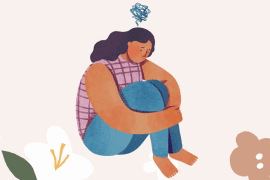The next time your child goes to lash out, rather than calling out verbal instructions from across the room, swoop in as fast as you can with the awareness and acceptance that he’s unable to stop when you ask him to stop. A child lashing out is caught in the grip of a rising tide of intense feelings that they simply can’t contain or control. Come down to his level, help him to stop lashing out verbally or physically by expressing your limit as gently as you can, while placing your hands on his body in a warm and affectionate way and truly connect, aiming to diffuse his anger and fear. You might need to take his hands, restraining him as gently as possible and say “I’m not going to let you break anything”, or “I can’t let you hurt your little brother”. This kind of expression is much less threatening than words like “don’t you dare”, “stop doing that right now”.
If they don’t get it out, they will act it out. You can tell your child that you want to help her get her frustrations out of her body. Talking to young children about feelings “in their body” helps them identify and name those feelings. As well as encouraging cries, you might offer her an alternative like tearing up an old magazine or stomping her feet or growling or screaming into a cushion. What you say isn’t as important as how you say it. When our children interpret our limits and guidance as loving leadership, care and support, it’s much easier for them to assimilate the limits and the positive expectations and much easier to calm down, return to reason and willingly cooperate.
There’s much that you can do to diminish the pressure on an already stressed child:
- Develop self-regulation, mindfulness and self-care skills that enable you to hold strong and steady during emotional storms, hence modelling the same.
- Increase moments of connection, warmth and humour to deepen their sense of safety and security and alleviate fears of disconnection.
- Give reassurances, choices, advance warnings and explanations to help them deal with the stress that limits bring.
- Listen in a way that invites them to talk, share, vent and cry, showing that you value them pouring out the upsets that otherwise weigh them down. Aggression is a cry out to offload tensions and feel heard.
- Commit to not lose your cool when your child loses theirs. Expecting a child to calm down while we criticism them is like sending them outside to play while restraining them.
Be assured that when their difficult feelings start to dissipate, your child can again feel comfortable and at peace in their own body, mind and heart.
One day when my daughter was five, she arrived at the dinner table and despite the fact that she loved her food, before I knew it, she hit the plate with full force sending it flying. The plate smashed to the floor, food went everywhere and my daughter flung herself onto the floor enraged and out of control. I was shocked and had no idea what had caused the upset but her actions were clear evidence that she was intensely distressed. I moved towards her expressing my sympathy for her distress with my arms outstretched. She initially growled at me “NO!”, to which I responded, “it’s okay honey, I’m looking after you, everything’s just all too hard for you right now isn’t it.” She cried and raged a bit more, then jumped into my arms collapsing into big deep releasing cries. I could feel her tensions melting away. “That’s it my girl, have a big cry.”
It’s time enough to talk with a child about what they could do differently next time when they’ve returned to a calm state and can reason again. It’s also time enough to deal with the destruction when a child’s emotional state is again regulated (yes I know this can be very hard, but if you can do this, you’re much less likely to have more of the same behaviour). Launching into talking about cleaning up while a child is still distressed is premature and would show that the parent is more concerned about the state of the floor than the child’s state of being. When caused accidently, it’s totally appropriate to say “oh dear, that’s a big mess, come on I’ll help you clean it up now”. But when a problem is the result of upset feelings, it’s best, if at all possible, to prioritize caring for those feelings.
Later that day, it all came out about how scared and overwhelmed my girl had been feeling in her class, how she’d felt like running out of the class. Yet, had I asked her in the heat of the moment about what was causing her upset, it’s unlikely she would have been unable to identify or express and the pressure to reason and explain would have likely escalated her distress.
The last thing that a child who is unable to contain their anger needs is to feel shamed, scorned or rejected. These tend to be the feelings that overwhelm the child in the first place. Some classic statements to avoid that further intensify a child’s negative feelings about themselves and their world and result in increased aggression: “you should be ashamed of yourself”, “I’m so disappointed in you”, “you should know better than to act like that”, “the world doesn’t revolve around you, you know”, “you’re not going to get away with acting like that in this family”, “are you happy now that you’ve made your sister cry”, “why can’t you be more like your sister”, “go to your room and come back when you’re ready to be a part of this family”.
Warm connection, quality time together, play and laughter are great ways to help children resolve and dissolve difficult feelings. When a child goes through a phase of defiance and aggression, tensions and power struggles can dominate the parent child relationship. Turning up the dial on fun and humour can be hugely relieving and fun!
It’s very challenging for parents to stay in their calm confident adult (as opposed to their hurt child state) when their child becomes reactive. Parents feel powerless, embarrassed, they can feel like they’re failing or their child is failing, they often become enraged. Adopting this approach of maintaining empathy when expressing limits or responding to aggression is the most effective way of addressing the problem at it’s source. When a parent supports their child to release their pent up fears and frustrations through talking, crying or harmlessly venting, they help to dissipate their urge to be aggressive. Especially, if ruptures (emotional disconnection) have happened during times of conflict, the child needs to regain feelings of acceptance and unconditional love during times of conflict.
Children who act aggressively need to be brought back into the family’s circle of love, belonging and security, they need and deserve to be reached in the heart, children always do.
You might also find these resources to be helpful:
The audio download of the Teleseminar “Getting back on track – Why we explode and what to do” by Genevieve and Patty Wipfler of Hand in Hand Parenting.
The article on the same subject “Why we explode and how to prevent it?” which discusses why parents are inclines to lose their cool and ways to prevent yelling at their child.
Dealing with Anger in the family and in yourself
Genevieve’s Stress Relief for Parents CD (also available on MP3) is a great resource for parents aiming to reduce the stress levels for themselves and their child. It offers a simple guided relaxation, guaranteed to relieve some tension and great for children trying to settle at bedtime, as well as lots of useful information about the parent’s journey of self-healing and equips you with self-regulation skills to help you manage your own frustration and stress.
What Causes Violence? by Aletha Solter PhD, psychologist and author of four parenting books
Genevieve Simperingham is a Psychosynthesis Counsellor, a certified Aware Parenting Instructor, parent educator, a blogger and public speaker. She’s been parenting with attachment principles from the beginning, her son is 21 and daughter 16. She runs the Peaceful Parent Institute in New Zealand and offers live and online events. Check out her website www.peacefulparent.com.










